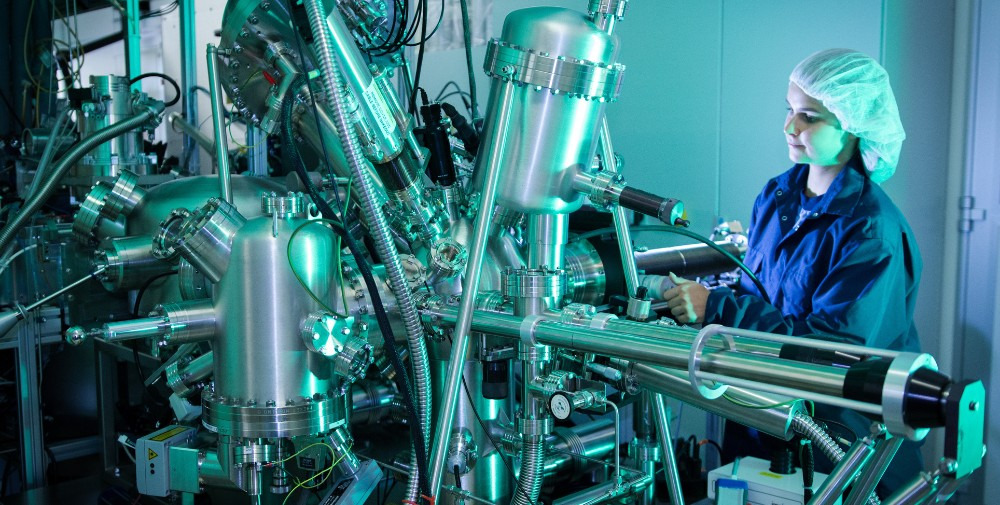September 7, 2023. ForLab follow-up project launched with an inaugural event
Categories
September 7, 2023. ForLab follow-up project launched with an inaugural event

Categories
Tags
Contact info
Silicon Saxony
Marketing, Kommunikation und Öffentlichkeitsarbeit
Manfred-von-Ardenne-Ring 20 F
Fax: +49 351 8925 889
Contact person:
In research-intensive microelectronics, universities play a pivotal role in the fast-paced innovation race. They unlock new knowledge, are essential research partners for industry – and, last but not least, educate the next generation of scientists. In a first step, the BMBF-funded project “Forschungslabore Mikroelektronik Deutschland (ForLab)” brought together 14 German universities active in microelectronics research. Through the ForLab project, they were able to invest in new facilities that will open up new areas of research.
This network is now being developed and expanded into a nationwide and internationally visible university network for semiconductor technology and microelectronics. The follow-up project “ForLab NataliE” (“Nachwuchstalente für die integrierte Elektronik” – early-career talents for integrated electronics) was launched in August 2023 with an opening event.
The headlines in the media are a seismograph for emerging developments: keywords such as ‘shortage of skilled workers’, ‘worries about young talent’ and ‘vacant positions’ are increasingly appearing in the news. The same holds true for the microelectronics industry in Germany. Attracting professional staff is increasingly becoming a key factor that requires the utmost attention. For Germany’s future development as a research and technology hub, it is essential that all partners throughout the education and training process pool, coordinate and strengthen their efforts in order to secure the next generation of professional staff. The relevance of microelectronics for future challenges such as digitalization, energy transition or e-mobility is a key aspect that needs to get more attention again: Microelectronics are a core requirement for sustainability and take place in Germany!
The ForLab NataliE project is based at the Center for Advancing Electronics Dresden (cfaed) and seeks to increase the visibility of microelectronics research at universities, accelerate technology transfer to applications, and promote training for new talented researchers beyond university boundaries. TU Dresden is coordinating the project (Prof. Thomas Mikolajick), with Ruhr-Universität Bochum (Prof. Martin Hoffmann) and Technische Universität Ilmenau (Prof. Jens Müller) as project partners.
More cooperation, easier access
“Through our project, we are aiming to consolidate the cooperation structures between the research laboratories and expand them to include even more university locations,” Prof. Thomas Mikolajick, the coordinator of “NataliE”, describes the project’s approach. Cross-site cooperation is a mainstay of the project: “By creating uniform approaches to cooperation and mutual use of the high-tech facilities in the cleanrooms, collaboration among researchers and access for both SMEs and startups will be made much easier,” project partner Prof. Martin Hoffmann of Ruhr University Bochum explains.
The available facilities, the research and teaching profiles and the universities’ industrial collaborations will be made visible via a “Competency Atlas”. Project partner Prof. Jens Müller of TU Ilmenau confirms: “By creating a high-quality information resource on the competencies of the ForLab partners, Germany’s and, in perspective, Europe’s microelectronics landscape will benefit from stronger networking, laying a foundation for synergies.”
The possibility of tendering several pilot projects for the promotion of talented individuals within NataliE is designed to create incentives for sustainable ideas for attracting new talent to research and industry: “We will initiate cross-university educational programs for students and for recruiting young talent as best practice examples throughout Germany. We will network with national and European educational initiatives such as the Microelectronics Academy of the Research Fab Microelectronics Germany (FMD),” says Mikolajick.
On the part of TU Dresden, NataliE is coordinated at the cfaed, benefiting from existing network and organizational structures. The NataliE project was launched in August 2023 with an inaugural event for all alliance members. During the two-and-a-half-year term, an annual, open expert conference will provide interaction and visibility. The first symposium “Microelectronics research in Germany: from fundamentals to application” will be held in Dresden in spring 2024.
Funding body: Bundesministerium für Bildung und Forschung (BMBF)
Period: August 1, 2023 – January 31, 2026
Coordinator: Prof. Thomas Mikolajick (TU Dresden, Chair of Nanoelectronics / cfaed)
Partners: Prof. Martin Hoffmann (Ruhr-Universität Bochum, Chair of Microsystems Technology), Prof. Jens Müller (Technische Universität Ilmenau, Head of the Electronics Technology Group)
Funding amount: EUR ~ 2.1 Mio.
About ForLab NataliE
ForLab NataliE seeks to maintain the established cooperation structure of the Research Laboratories for Microelectronics (ForLab) funding measure of the Federal Ministry of Education and Research (BMBF) and to expand it as an alliance, to facilitate access to the ForLabs and to strengthen the visibility of the existing infrastructure. Using the infrastructure to recruit early-career academics will be a particular focus. In doing so, the project will make an essential contribution to ensuring that innovative semiconductor chips and microelectronic systems will continue to be expertly developed in Germany in the future.
For more information, please visit: https://www.elektronikforschung.de/projekte/forlab-natalie
About the ForLab alliance
The research equipment of the Microelectronics Research Laboratories (ForLab) was modernized and expanded through an investment program of the BMBF as part of the project funding from 2019-2023. This has opened up new research fields in microelectronics at a top international level at 12 ForLabs throughout Germany. Various measures during the project term promoted and strengthened the networking of the ForLabs.For more information, please visit: https://www.forlab.tech/
About cfaed – Center for Advancing Electronics Dresden
The cfaed is a research cluster at TUD Dresden University of Technology. As an interdisciplinary research center for perspectives in electronics, it is located at TUD as a Central Academic Unit and brings together members from non-university research institutions in Saxony and Saxony-Anhalt as well as the TU Chemnitz. The Cluster is dedicated to the fundamentals of future-proof information technologies beyond today’s silicon-based devices. To achieve its goals, the cfaed combines the discovery-driven natural sciences with the innovation-driven engineering sciences. www.cfaed.tu-dresden.de
👉 https://cfaed.tu-dresden.de/
Media inquiries:
TU Dresden, Center for Advancing Electronics Dresden:
Prof. Thomas Mikolajick
Tel.: +49 351 463 41106
Email: thomas.mikolajick@tu-dresden.de
Matthias Hahndorf
Science Communication
Tel.: +49 351 463 42847
Email: matthias.hahndorf@tu-dresden.de